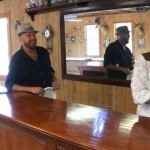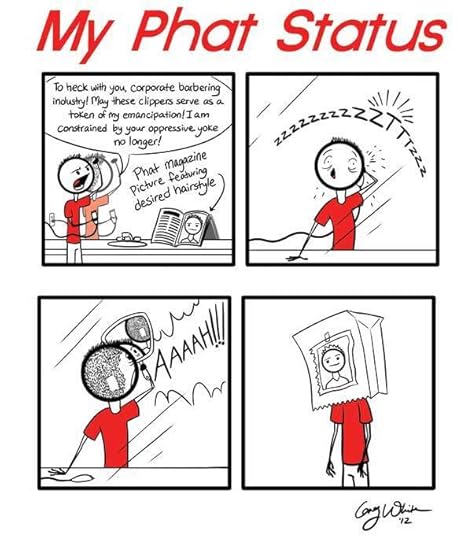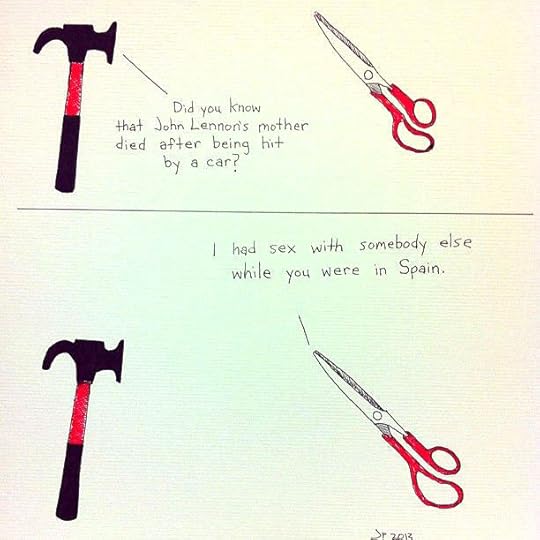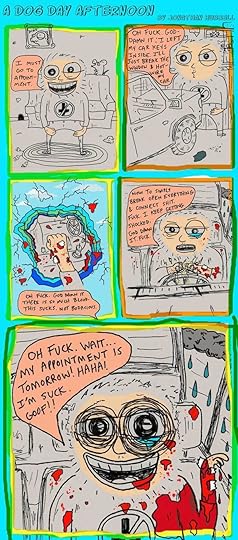Charles Martin's Blog, page 33
August 19, 2014
My Phat Status – Hair Care
August 18, 2014
Circus Ex Circus – 48 Hour Film Project
Circus Ex Circus premiered last weekend at the Sandridge Auditorium to a strong reception. It was SGI Productions’ second year to compete in the international contest with 2013′s entry, Latte Art, taking home two awards in the Oklahoma City leg. Award nominations will be announced soon and the awards show will be 6:30 pm, September 19 at The Paramount in Oklahoma City. Here is what we came up with:
Problems viewing? Watch on YouTube.





Sex in Spain
August 17, 2014
In Stores Now: Literati Presents
Our region is flush with amazing writers and artists, enough talent to redefine the literary culture of the American Heartland. To tap into this incredible resource, we created Literati Presents as a semiannual anthology of short fiction and comics all focused on a central theme unique to each issue. Available only in stores or in person, Literati Presents has quickly become our signature title. We love working with independent retailers with a love for the underground. If you know of a shop that should be carrying Literati Presents, email sales@literatipressok.com!
Here is where you can currently find the latest issue of Literati Presents:
Hancock Creative Shop
hancockcreativeshop.wordpress.com
116 S 2nd
Guthrie, OK
(405) 471-1951
Speeding Bullet
614 N Porter Ave, Norman, OK 73071
(405) 360-6866
Stash
412 E Main St
Norman, OK 73071
(405) 701-1016
New World Comics
6219 N Meridian Ave, Oklahoma City, OK 73112
(405) 721-7634
Dig It!
1739 NW 16th Street, Oklahoma City, OK 73106
Second Chance Books
3909 N MacArthur Blvd
Oklahoma City, OK
(405) 603-7151
Empire Strikes
www.facebook.com/EmpireStrikes
600 NW 23rd St
Ste 103
Oklahoma City, OK 73103
August 15, 2014
Robin Williams and the Sine Wave of Suicidal Ideation
The first date I went on- my first legit “pick you up at seven, I have my mom’s car for the night” date- was with Kalli Fullbright. I took her to see Aladdin. It was magical. Mostly because I sat by a pretty girl and got to kiss her. But also because suddenly there was a new Disney cartoon that was worth watching. It was a good story, but way more important to a pudgy, over-acned sixteen-year-old-boy: it was fucking hysterical.
Several years later, I sat between my friend and his girlfriend (who I was not-so-secretly in love with) as we all watched and laughed and cried our way through Good Will Hunting.
These are minor/major moments in my life that included Robin Williams and his turned-up-to-eleven charisma projected in front of me.
I liked some of his movies, some of his comedy. I mostly liked his surprises.
I wasn’t that much of a fan of Robin Williams. I just kind of liked him sometimes. Didn’t care for Mrs. Doubtfire. I thought Patch Adams was awful.
But there was something about that guy.
I said in a text to a friend, “Ubiquity, but in a good way.”
I’m not wanting to talk about how great or not-great any of his movies or television appearances were (although the final moment of his performance as himself in that episode of Louie gives me serious pause).
I kind of feel inclined to talk about how weird and significant it is when a famous person dies, that we “normal people” can take it so personally. But I’ve talked about that too many times in my life.
What I feel like talking about is me. Like usual.
I’ve spent most of my life with suicide. I don’t make much of a secret that I’ve had chronic depression since I was a kid; that it gets really fucking dark, and way too often. I tried to kill myself in 1999, and again a little over ten years ago, and then again a few years later. I have often found myself considering my survival as just one of my many failures.
I probably never told you how angry I feel when I hear the suggestion that failed suicides are a cry for help, or how that if I had owned a gun in those years I would most assuredly be dead.
I may not have mentioned that in April 2013, I set a hard, fast date and a plan for the day I would finally die. A date by which I would own a goddamned gun.
Then Taylor died, and his death taught me the ugly lesson that I don’t get to kill myself.
I’ve been in therapy for the last eight or nine months. It’s helped. I work in an environment that is emotionally challenging, but where my job requires me to be responsible with my emotions, to “manage” them. That’s helped, too.
I’ve been severely depressed during much of the last year, but my thoughts have turned to suicide far less often than they used too.
But “less often” is not “never.”
Lemme tell you a story:
In 2003, I lived in Chicago. When the Cubs blew their series against the Marlins in the National League Championship Series, my reaction was wholly irrational and wholly typical of somebody with my emotional dysregulation. I spiraled completely out of control. I used a lot of drugs- a LOT OF DRUGS- and drank constantly (I drank more often than I got high because drinking is socially acceptable when you’re in your mid-twenties, especially in the city of Chicago. A place where everybody is a drunk).
Now. That episode of depression wasn’t about baseball, of course. It was about the fact that the only thing in my life giving me any sense of joy was now over. I couldn’t see anything positive to look at anymore, and winter was beginning.
Around the same time, I got some sad news. A friend told me that his friend’s father had died. He killed himself. This man was around sixty years of age. A man who owned a successful business. A man with a family, the members of which were, for the most part, happy and healthy. He had grandkids.
The message that day was the same message I got this week when I read that Robin Williams had died of an apparent suicide.
This will always be the condition of my life.
This sine wave of: Okay → Numb → Intensely Morbidly Sad → Numb Again: this would last for as long as I could take it.
And one day, don’t kid yourself, Marty, you will definitely not be able to take it.
I have always assumed that, barring catastrophic accident, I will one day die by my own hand.
That has, at times, seemed so incredibly dumb to me. And not in that simple, “Suck it up” kind of way. This feeling has always preyed on the most formative aspect of my psyche. This feeling says to me:
You aren’t as smart as you think you are.
I’m pretty smart, guys. Way smarter than average.
That’s what I’ve always been told, always been shown, always believed.
I believe it for the better part of most days, anyway. And then I get a minute alone and remember that no book I will ever read, no amount of philosophy or theology, no clever grammar jokes will ever make me feel known or loved.
I can not outsmart my diseased brain.
The sickness in my brain is smarter than me and it is trying to kill me.
I can fight it- and I do every day- but all the evidence shows that my sick brain is going to win.
I have found a trick, though. A sneak attack against the tyranny of my brain.
It is this:
I will tell you about this feeling.
I will tell you now that I feel constantly desperate. I feel at every moment like I could just as soon drift into the ether and disappear from you and any potential love that I may feel. I could easily die in the cold under a bush in Uptown or on a train in Edgewater or in an apartment in Lincoln Square or Hyde Park or Shawnee, OK or on the river or headed to Austin or walking away from any commitment, any engagement.
I am telling you that I think often of my own death.
But I don’t want to.
And now you know this.
You are my friend and publisher. You are my ex and/or future girlfriend. You are or have been my boss or I am or have been yours. You used to live in an apartment with me in Chicago or a house in Portland or Oklahoma. You were my lover’s parents. You are a correspondent for NPR. You edit a weekly publication. You paint trees and moonlight. You tell jokes on a stage. You’re a priest or pastor. You are getting married soon or will be divorced in no time. I sang at your wedding or skipped it entirely. I served you coffee in Chicago or Portland or Oklahoma. You served me coffee in one of those places. We met briefly or loved long or emailed once or never actually met at all. You are my mom or dad, my sister or brother. Literally or figuratively.
And you are now on the hook.
Is that a thing you can do? When you see me getting weird and shitty, can you pull me close so I don’t drift away?
In return, I offer you this:
I am now on the hook, too.
I love you and love you and love you. I do not want to leave.
Bleeding Out – The Courage of Confessional Comics
Storytelling that cuts to the quick always impresses me. It can be magical to watch someone bleed themselves dry in a desperate attempt to rid pain from their system by cutting open every vein. True, many times it’s just self-indulgent shoegazing, but if the stories are raw and honest, they can be as visceral and dazzling as a car crash.
I am particularly drawn to this in illustrated works. I like superheros and zombies and vigilantes and talking cats/tigers/monsters, but I love confessional comics the most. It Did Happen by Jessica Garvey is a great example of how a simple story with a lot of implied emotional weight can result in a substantive and rewarding reading experience. It Did Happen is an autobiographical account of Garvey learning that an ex-boyfriend was caught up in a brutal attack years after they broke up. The story is just a series of moments surrounding the time when she learned of the attack interlaced with flashbacks from their brief relationship. What starts out as a simple, sad coincidence is slowly revealed to be something darker and more complex. Garvey uses the obscuring quality of the illustrated format to elegantly unfold the story so that the reader can add their own emotional context. Garvey doesn’t tell the reader how to process the tragedy, but forces them to find their own way to untangle the emotional knot.
Intimacy can, of course, be achieved in all art forms, but the visual component of illustrated storytelling adds a dimension of vulnerability that can make the reader feel as if they are invading the creator’s privacy. They’ve been entrusted with a dark secret. In film, the viewer is aware that “acting” is happening, no matter how deft the filmmakers are at hiding it. In traditional fiction, the author’s voice controls the context of events.
But in comics, when it is done well, there is so much more space between the dialogue and between the panels. The reader is forced to roam for answers just as the creator did while living through the experience. We get all the juicy parts of the secret, but without the rationalizations. It is just moment to moment, which can be incredibly powerful if the creator is brave enough to allow the audience to make their own decisions on what the events mean.
Garvey is a fellow Okie and more of her stories can be found at jessicartworks.com. Her confessional style is greatly needed in our developing comics community. There are a few other local artists delving into slice of life storytelling, like our own Eric Gorman. These creators are key to developing a wider readership not usually drawn to traditional comics. We do need the superheroes and the zombies and the talking cats/tigers/monsters, but we also need the pure emotion to further legitimize illustrated storytelling as an inclusive art form.
August 13, 2014
The End Of The Town Where All Things Are Possible
Need To Catch Up?
In The Town Where All Things Are Possible, tree branches rustled lazily with the breeze, casting shadows across a cobblestone pathway that wound through the town’s park and ended at the iron door. Alexandria pulled The Man’s arm back over her shoulder and they stepped out into the sunlight. She scanned the trees, then saw the ice rink in the distance.
A group of boys appeared up the path, running and laughing as a black-and-brown mutt followed close behind. The boys turned and one of them threw a tennis ball along the path. The dog sped after it. The ball hopped awkwardly across the cobblestones and rolled to a stop a few feet from the Man. The dog slowed as he saw the pair. He stepped toward the Man and sniffed at his hurt leg.
“Tobey!” the boy called.
The dog backed from the Man, snatched the ball in his mouth and returned to the pack to drop the ball at the boys’ feet. They ignored the dog as they watched the Man and Alexandria.
“Is everyone okay?” the Man called to the boys.
The boys looked at one another.
“Yeah,” one of them replied. “What happened to you?”
Alexandria could see the Man’s confusion. He was looking out across the park toward the town as if expecting to find a mushroom cloud or some other magnificent calamity.
“Can someone go find us some help?” Alexandria asked as she began helping the Man up the path.
The boys leapt into action, running back out of view. The dog barked back down to the Man, retrieved his tennis ball, then sprinted off into the boys’ wake.
As Alexandria led the Man to the ice rink, she glanced down at his leg and found the blood still flowing. She lowered him down onto the bleachers.
“Hold on,” Alexandria told him. She looked over the leg, but couldn’t decide what to do. So she leaned over his face, brushed his messy hair away from his eyes, and kissed his lips.
A herd of townspeople rushed toward the ice rink. The mayor carried her high heels in one hand as she led the way, barefoot.
“Where is he?” the mayor called.
“Dead,” the Man said. “It’s all over.”
Leo rushed out ahead of the crowd and reached them first. He began examining the Man’s leg, then waved to a woman in the crowd.
“Beth, go get your truck, we need to get him to the clinic!”
Beth turned and ran back towards downtown.
“You’re gonna be okay, Jeffrey,” Leo said as he ripped the pant leg around the wound to get a better look.
The Man gazed across the crowd, then to downtown, toward God’s Blowhole. She could see the light dimming in his eyes. He was fighting, but the blood loss was pulling him under.
“Did anything happen?” the Man asked the mayor.
“When? What do you mean?” The mayor grimaced at a flash of bone protruding from the Man’s thigh.
“Did anything unusual happen?” the Man asked.
“No,” the mayor answered. “We were all worried sick about what was happening down below.”
A humming engine approached. The crowd parted to make room for a truck backing towards the bleachers. It stopped a few feet away.
“I grabbed a plank to use as a stretcher,” Beth called as she climbed out of the driver’s side and opened the truck bed. Gerald appeared out of the crowd and helped her bring the plank. Leo, Gerald, the Beth, and Alexandria transferred the Man to the plank and carried him to the truck. Alexandria rode in the back, holding the Man’s hand as they passed downtown.
“Stop!” the Man shouted. He banged against the truck bed. The truck eased to a stop beside the flagpole.
“What’s wrong?” Leo called from the passenger side.
“Help me up,” the Man said to Alexandria.
He began pushing himself up to see over the bed of the truck. She reluctantly helped him up by his elbow. He looked down at the grate covering God’s Blowhole. He studied it.
“What’s happening?” Leo asked.
“Ssh,” Alexandria responded.
She watched the grate with him.
“Nothing happened,” the Man said.
“Buddy, we have to get you to a doctor,” Leo urged.
The Man sighed, shook his head, then allowed Alexandria to ease him back down on the plank.
***
A rap on the door brought Alexandria out of her nap. She straightened in the hardwood chair. Her eyes fluttered open and found the Man sleeping heavily, his leg fixed in a cast, his shoulder and arm wrapped. A muted television looked down on the clinic’s only overnight room. Alexandria stretched and walked to the door.
She opened it to find Mrs. Gratherson and Tessa. The old woman motioned for Alexandria to join them in the hall.
Alexandria softly closed the door behind her. Mrs. Gratherson watched Alexandria with a cold glare.
“You will never speak of what happened in those tunnels,” she said. “Ever. Do you understand me?”
“Yes.” Alexandria answered.
Mrs. Gratherson turned and clicked her walker along the clinic’s linoleum tile floor.
Tessa lifted up a potted plant with a single blue flower sprouting up. The same flower from the roadside. The same flower that Tessa used against the killer.
“A welcome gift to our town’s newest resident,” Tessa said.
Alexandria hesitated taking it.
“Don’t worry, it will listen to you.”
Alexandria accepted the pot, arms out extended as if receiving a soiled infant. Tessa chuckled and turned to follow the old woman. The mayor stood at the far end of the hallway waiting for the two women. Alexandria met the mayor’s eyes and the mayor managed a rigid smile. Alexandria returned to the room, closed the door behind her with her foot and placed the plant on the windowsill. She considered for a moment, then moved it into the bathroom and shut it inside.
***
The Man Who Held The Town Together returned to his job once he woke the next day. Alexandria pushed his wheelchair down to God’s Blowhole. He held three cards between his palms, whispered to them, then leaned down from his chair, straining to reach the grate. He dropped the cards down into the hole.
Without a word, Alexandria pushed him back up to the small office. This continued throughout the Man’s recuperation, Alexandria visiting him every morning and evening as he ran his errands, but never with the same urgency as before.
Alexandria began reorganizing the shelves of The Wider World Books And Novelties, clearing off the clutter from the front and stationing the blue flower near the front window like a watchdog. She was beginning to see herself in the store. She still felt trapped and conspicuous inside the town, but less and less like a stranger.
Once the Man graduated to a cane, he told Alexandria she was free to skip her trips up to his office on the hill. But she still came twice a day, for she saw a sadness filling him. Day by day, she was losing him.
On a fall afternoon, nearly five months removed from the death of Alexandria’s would-be killer, she found the Man sitting beside his desk, cards strewn about the office. He wore a dark scowl.
“Darling,” she began.
“I’m not going,” he cut her off. “None of this matters.”
Alexandria stepped toward an upended box and knelt beside it.
“Leave it,” he said.
Alexandria paused, then righted the box and began putting the cards back in.
“It doesn’t matter,” the Man said. “None of this matters. It was never about the cards. The Town simply does what it wants to do. We have no control over any of this.”
“You don’t know that,” Alexandria responded, her voice calm and patient while she worked.
“You proved it by tossing that box in,” the Man responded. “Something should have happened.”
Alexandria put the last card back in and replaced the lid. She stood up.
“Something did happen,” Alexandria said. “Nothing. And the man that would have killed me killed himself instead.”
The Man looked away.
“I’m not going,” he said. “I’m done with this.”
Alexandria stood up and watched the Man. He was diminished and it broke her heart. The end of the cards might mean the possibility of a normal life. She knew this. She’d long hoped for it.
But it would also be the end of a part of him.
“We could try to leave the Town again,” the Man said. He leaned on his cane and struggled to his feet. “We could try every day in every direction until we find a way out.”
She turned from him and looked through the window to the sprawling countryside creeping up to the cliffs. They could run. Perhaps the Town would follow them, like he once believed. Some dark magic would chase them to the ends of the Earth, punishing them for their escape.
Or they would leave and nothing would happen. The Town would forget the lovers as they found a new life.
Alexandria walked back to the box, opened the lid and looked through the cards. She picked one out, grabbed a pencil from the desk and wrote on the back of it.
“One more,” she said, folding the card so that her new wish was hidden from the Man.
“One more wish and, if this comes true, we stay,” she said. “If it doesn’t, we leave.”
The Man took the card from her, but she held his hand.
“Don’t read it,” she said.
“How will I know if it comes true?”
“You will,” Alexandria said. “Trust me, you will.”
She lowered her hands and held her eyes on his.
“Okay,” he said. “One more wish.”
She laced her arm around his elbow and they walked through the door, down the hill, and toward the heart of The Town Where All Things Are Possible.
THE END
August 8, 2014
Live On The Plaza and 48 Hour Film Project
We will be posted up outside Dig It tonight at 1739 NW 16th in OKC from 6-9 pm selling books, comics, and caricatures. We will also be prepping for a long Saturday shoot for SGI Production’s 48 Hour Film Project entry. The annual contest challenges filmmakers to write, film, edit, and produce a seven minute movie in two days. Gonna be a big night for us so you should come out, say “hi”, and take our minds off of the stress of living up to last year’s competition where SGI’s “Latte Art” won two awards and was nominated for Best Film. We’ll be sending out updates on our efforts to produce a masterpiece so significant that it will change world history forever, so stay tuned for that.
Following is the director’s cut of our 2013 submission:
August 7, 2014
A Dog Day Afternoon
August 6, 2014
In The Town Where All Things Are Possible: Part 25
Need To Catch Up?
Underneath The Town Where All Things Are Possible, Alexandria’s scream locked up inside her throat. As they fell, the Man clung to her as she clung to the box, water glittering all around them.
They crashed into steel. A frail bridge crumpled under their weight, the braces snapping on one end. The bridge bowed and tipped toward the void, then held. The Man lost grip of Alexandria and rolled along the bridge toward the gaping edge. His hand caught a handrail just as his body rolled over. He hung above God’s Blowhole. Alexandria braced herself from above, one arm wrapped around a handrail, the other tight around the box. From beneath, she felt the warmth emanating up from the chasm, just as she had before.
“Jeffrey!” Alexandria called.
“I’m fine,” he said, sweeping his other hand up to the rail, then pulling a foot up to the edge of the bridge. “Hold on, I’ll be up there in a minute.”
The sunlight poured down on them as the stream fell like a hard rain. She could see blood seeping from the Man’s shoulder and left thigh. He only used his right leg to climb as the left hung, limp and broken.
“Where is he?” Alexandria called. “Can he get to us in here?”
“Yes I can, little girl.”
Alexandria jerked her head up towards the voice. There the killer stood, at the bridge’s base. He watched them, knife held out and ready. In his other hand was the flashlight, turned backwards as a blunt weapon.
“Hand me the wishes and I will let Jeffery live,” the killer said.
“Leave her alone,” the Man replied. “We will work this out.”
The Man climbed up another railing and the bridge shook. Alexandria scanned the walls around, looking for options. The hole was massive, at least thirty feet across, the walls were smooth. The killer stood on an artificial walkway that wrapped along the wall and stopped twenty feet below them. It circled all the way up God’s Blowhole as it narrowed, finally stopping at the small grate where the sunlight poured in. They were on the only bridge that led across the expanse. She considered dropping down to the walkway along the wall beneath her, but there were no other tunnels to escape into. She would still be trapped.
The killer knelt down, placing the flashlight on the ground, then reached out his hand.
“Hand it to me,” the killer said.
Alexandria looked down to the Man.
“I’m sorry,” she said.
“Alexandria, don’t!”
She threw the box.
“No!” the killer shouted.
The box tumbled down God’s Blowhole. The lid fluttered off and the cards poured out, some fluttering free of the box and spinning away from the waterfall, others tumbling into the abyss.
The killer backed away from the bridge. He began a quick retreat up the walkway. Unsure, he stopped and gazed down into the hole.
“Hurry!” the Man shouted.
Alexandria climbed up the bridge to the walkway. She held her hand down for the Man as he struggled up through the falling water. He took her hand and she pulled him to the edge, careful not to lose grip of his soaked palm. Alexandria grabbed the flashlight and stood up to face the killer. He still watched the hole, waiting for God’s answer.
“You’ve killed us,” the killer whispered, just above the sound of the rushing water.
The Man used the walkway railing to pull himself up onto his one good foot. Water and blood soaked his left side.
Alexandria pulled his right arm over her shoulder and helped him limp up the walkway. She held the flashlight ready as they neared the killer. Her eyes on the knife still clutched in the killer’s hand.
“Go,” the killer said, not looking at them. “It no longer matters. None of us will survive.”
The killer turned to Alexandria.
“Hell is coming, little girl.”
The killer climbed over the railing, took a deep breath, then leapt over the side. He fell into God’s Blowhole with his arms out wide as a child falling into his father’s waiting hands.
Alexandria listened for the impact, but heard nothing. He simply vanished.
“Hurry,” the Man grunted.
She helped him up the winding walkway, his broken leg dragging behind. As they progressed upwards, she intermittently looked down into the hole, waiting for something to happen.
They reached a tunnel cut into the wall of God’s Blowhole. A chill crept from the tunnel. Further above, she could see the storm sewer where the killer had first tried to take her life. Where she’d been saved by The Man’s card fluttering down from the grate.
“In here,” the Man said, motioning to the tunnel. Frigid air met them in the darkness. Alexandria turned on the flashlight, illuminating a long stone tunnel with frost covering the walls. Further in, horizontal chambers were cut into the stone, three high on both sides. Hundreds of them.
“Go!” the Man urged.
They moved deeper into the tunnel as the temperature continued to drop. The Man shivered violently as she could see the moisture on his clothes turning to frost. They reached the first series of chambers and Alexandria trained the flashlight beam on them.
Bodies laid on their backs, heads positioned toward God’s Blowhole. Their hands were pressed together, as if praying. Between their palms was a single piece of paper. All men, all wearing white robes.
“It’s our catacomb,” the Man said as he hopped forward on his one good leg while leaning against Alexandria.
All of the men’s faces seemed fresh, preserved, though chilled. No decay. As they passed the chambers, she saw the slips of papers replaced by notecards, the same that the Man used.
In the last occupied slot, she saw the killer. Hands pressed together, a card between the palms, eyes closed. Alexandria steadied the beam on him, her breath held, waiting for him.
“He won’t bother us again,” the Man said, urging her forward.
They moved on, past dozens of empty chambers, one of which waited for the Man.
They reached a turn and the chill faded quickly, she swung the flashlight back through the catacombs toward God’s Blowhole.
God remained silent.
“What’s going to happen?” Alexandria asked.
“Keep moving.”
The passed into another, smaller room with a spiraling staircase. The Man gritted his way up thirty steps before reaching another tunnel.
Alexandria kept listening for the hell the killer promised, but only heard the water rushing underneath. More tunnels came, the Man hobbling forward with Alexandria’s help. He was leaning heavier on her as the blood continued to seep from his leg.
“What’s going to happen?” Alexandria asked again but received no answer.
An iron door appeared ahead. Alexandria hurried their pace. The Man leaned away from her and against the handle. He looked to Alexandria. He reached his hurt arm up, his hand cupping her cheek, leaving a stain of blood. She moved toward him. The kiss was soft and it loitered for several heavy heartbeats. He pulled his lips back, but held his forehead to hers.
“You were worth it,” he said.
He leaned away, lifted the latch, then pulled the door open.
Alexandria leaned around him to see what horror she’d inflicted on the Town.
CONTINUE …






